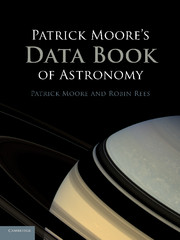Book contents
- Frontmatter
- Contents
- Foreword
- Preface
- Acknowledgements
- Notes about units
- 1 The Solar System
- 2 The Sun
- 3 The Moon
- 4 Mercury
- 5 Venus
- 6 Earth
- 7 Mars
- 8 Minor members of the Solar System
- 9 Jupiter
- 10 Saturn
- 11 Uranus
- 12 Neptune
- 13 Beyond Neptune: the Kuiper Belt
- 14 Comets
- 15 Meteors
- 16 Meteorites
- 17 Glows and atmospheric effects
- 18 The Stars
- 19 Stellar spectra and evolution
- 20 Extra-solar planets
- 21 Double stars
- 22 Variable stars
- 23 Stellar clusters
- 24 Nebulæ
- 25 The Milky Way Galaxy
- 26 Galaxies
- 27 Evolution of the universe
- 28 The constellations
- 29 The star catalogue
- 30 Telescopes and observatories
- 31 Non-optical astronomy
- 32 The history of astronomy
- 33 Astronomers
- 34 Glossary
- Index
32 - The history of astronomy
Published online by Cambridge University Press: 05 June 2012
- Frontmatter
- Contents
- Foreword
- Preface
- Acknowledgements
- Notes about units
- 1 The Solar System
- 2 The Sun
- 3 The Moon
- 4 Mercury
- 5 Venus
- 6 Earth
- 7 Mars
- 8 Minor members of the Solar System
- 9 Jupiter
- 10 Saturn
- 11 Uranus
- 12 Neptune
- 13 Beyond Neptune: the Kuiper Belt
- 14 Comets
- 15 Meteors
- 16 Meteorites
- 17 Glows and atmospheric effects
- 18 The Stars
- 19 Stellar spectra and evolution
- 20 Extra-solar planets
- 21 Double stars
- 22 Variable stars
- 23 Stellar clusters
- 24 Nebulæ
- 25 The Milky Way Galaxy
- 26 Galaxies
- 27 Evolution of the universe
- 28 The constellations
- 29 The star catalogue
- 30 Telescopes and observatories
- 31 Non-optical astronomy
- 32 The history of astronomy
- 33 Astronomers
- 34 Glossary
- Index
Summary
To give every date of importance in the history of astronomy would be a mammoth undertaking. What I have therefore tried to do is to make a judicious selection, separating out purely space-research advances and discoveries.
It is impossible to say just when astronomy began, but even the earliest men capable of coherent thought must have paid attention to the various objects to be seen in the sky, so that it may be fair to say that astronomy is as old as Homo sapiens. Among the earliest peoples to make systematic studies of the stars were the Mesopotamians, the Egyptians and the Chinese, all of whom drew up constellation patterns. (There have also been suggestions that the constellations we use as a basis today were first worked out in Crete, but this is speculation only.) It seems that some constellation-systems date back to 3000 BC, probably earlier, but of course all dates in these very ancient times are uncertain.
The first essential among ancient civilisations was the compilation of a good calendar. Probably the first reasonably accurate value of the length of the year (365 days) was given by the Egyptians. (The first recorded monarch of all Egypt was Menes. who seems to have reigned around 3100 BC; he was eventually killed by a hippopotamus – possibly the only sovereign ever to have met with such a fate!) They paid great attention to the star Sirius (Sothis), because of its ‘heliacal rising’, or date when it could first be seen in the dawn sky, gave a reliable clue to the time of the annual flooding of the Nile, upon which the Egyptian economy depended.
- Type
- Chapter
- Information
- Patrick Moore's Data Book of Astronomy , pp. 526 - 535Publisher: Cambridge University PressPrint publication year: 2011



